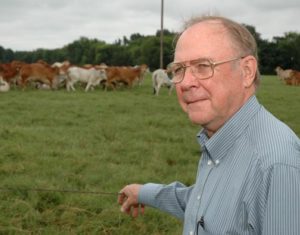AgriLife Research beef cattle physiologist Randel retires
OVERTON – Dr. Ron Randel, Texas A&M AgriLife Research physiologist, announced his retirement after more than four decades of beef cattle research and teaching.
Randel said he left a good position with the U.S. Department of Agriculture’s Agricultural Research Service in 1974 to join AgriLife Research. He enjoyed the research aspect of the USDA job, but longed to teach outside the classroom.
“What was lacking was the ability to work with and mentor grad students,” he said. “It’s the primary reason I took this post.”

Randel has been based at the Texas A&M AgriLife Research and Extension Center in Overton for the past 45 years. He has dedicated himself to researching beef cattle physiology and temperament in addition to helping mold future physiologists.
He was part of a movement to develop a strong and successful off-campus program that mentored and taught graduate students applied science principles. Randel said he will continue in an emeritus capacity in order to finalize ongoing grant projects.
Randel said he is very proud of his mentorship and off-campus roles. He guided 80 post-graduate students over the years, including 47 masters and 33 doctoral graduates.
“As an educator and mentor, in my view, your legacy is your students,” he said.
Randel oversaw several projects focused on the reproductive physiology of tropically adapted cattle, the nutrition-reproduction interaction and, most recently, the temperament and stress responsiveness of beef cattle. He has researched the physiology and endocrinology of ovarian and pituitary functions in Brahman cattle for more than four decades.
“Our research resulted in improved application of artificial insemination in Bos Indicus and Bos Indicus crossbred cattle,” he said. “We’ve also been able to better understand the importance of nutrition in reproduction. Our research on temperament clearly shows temperament can be measured efficiently and effectively. These are all important to the producer because they affect productivity and profit.”
For instance, Randel’s work on cow temperament showed docility traits could be selected, calmer cattle showed higher average daily gains and that prenatal stresses on cows could impact the temperament of the calf.
“When we understand what the problems are related to reproduction and an overall calf crop, it can change the industry,” he said. “Whether it’s endocrinology and reproductive functions to management and nutrition, seemingly small advances have enormous impacts for producers.”
Randel developed an internationally recognized research and graduate student reproductive biology training program and has presented invited papers on reproductive and stress physiology topics on six continents, according to his AgriLife Research biography.

“Often people say they plan to travel after retirement, but I’ve been one of the luckiest people in the world because I’ve traveled extensively in this position both nationally and internationally,” he said.
Randel has produced more than 1,000 papers for science publications during his career.
Randel advanced to full professor in 1978 and was named a Faculty Fellow and a Regents Fellow in 1999, a Senior Faculty Fellow in 2005, and an American Society of Animal Science Fellow in 2007. He was designated a distinguished alumnus of both Washington State University and Purdue University.
He received the American Animal Science Society’s Physiology and Endocrinology Award in 1996. Randel also was the recipient of the 2012 L.E. Casida Award for excellence in graduate education in physiology and endocrinology.
In 2017, the American Society of Animal Science, Southern Section, announced an annual lectureship for physiology named for Randel.
Randel credited his fulfilling career to the support of his wife Colleen and son Lowell.
“I don’t intend to just sit at the house in a rocking chair,” he said. “But I may.”


